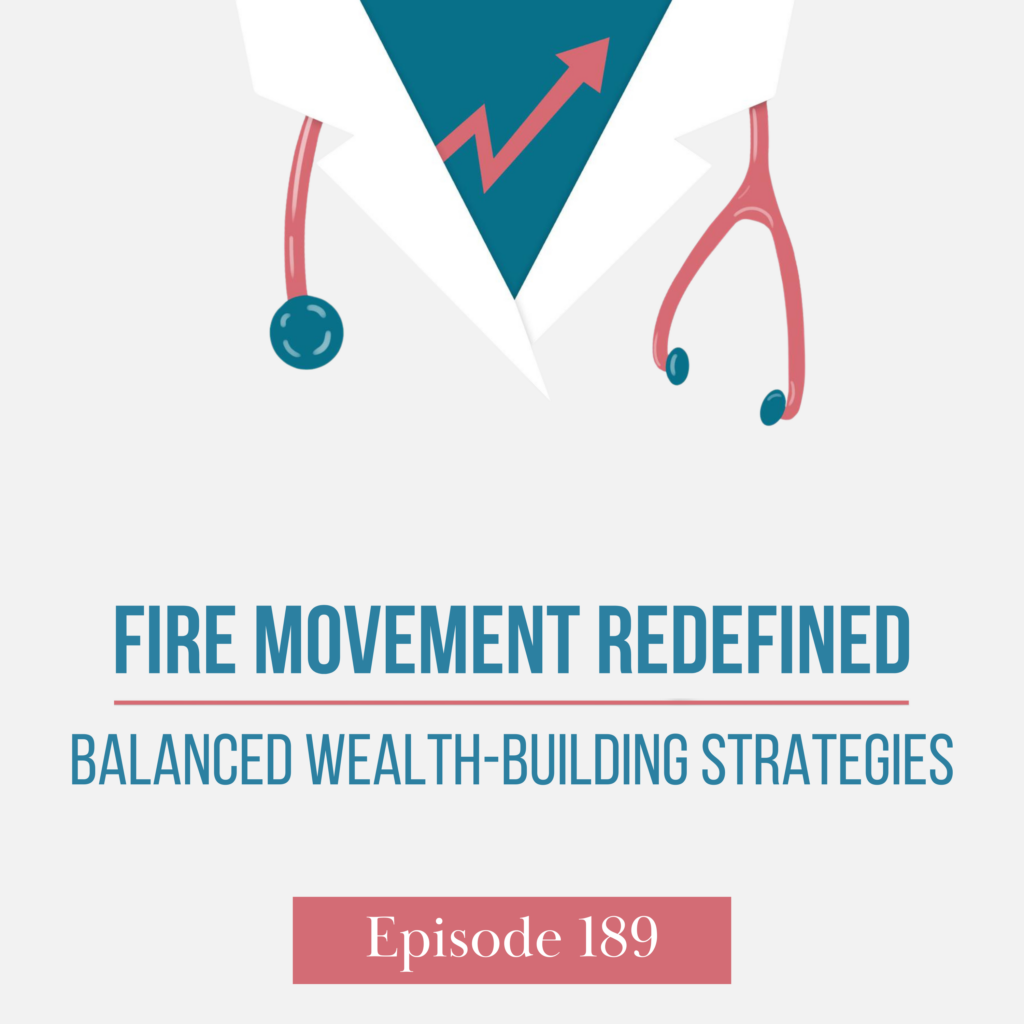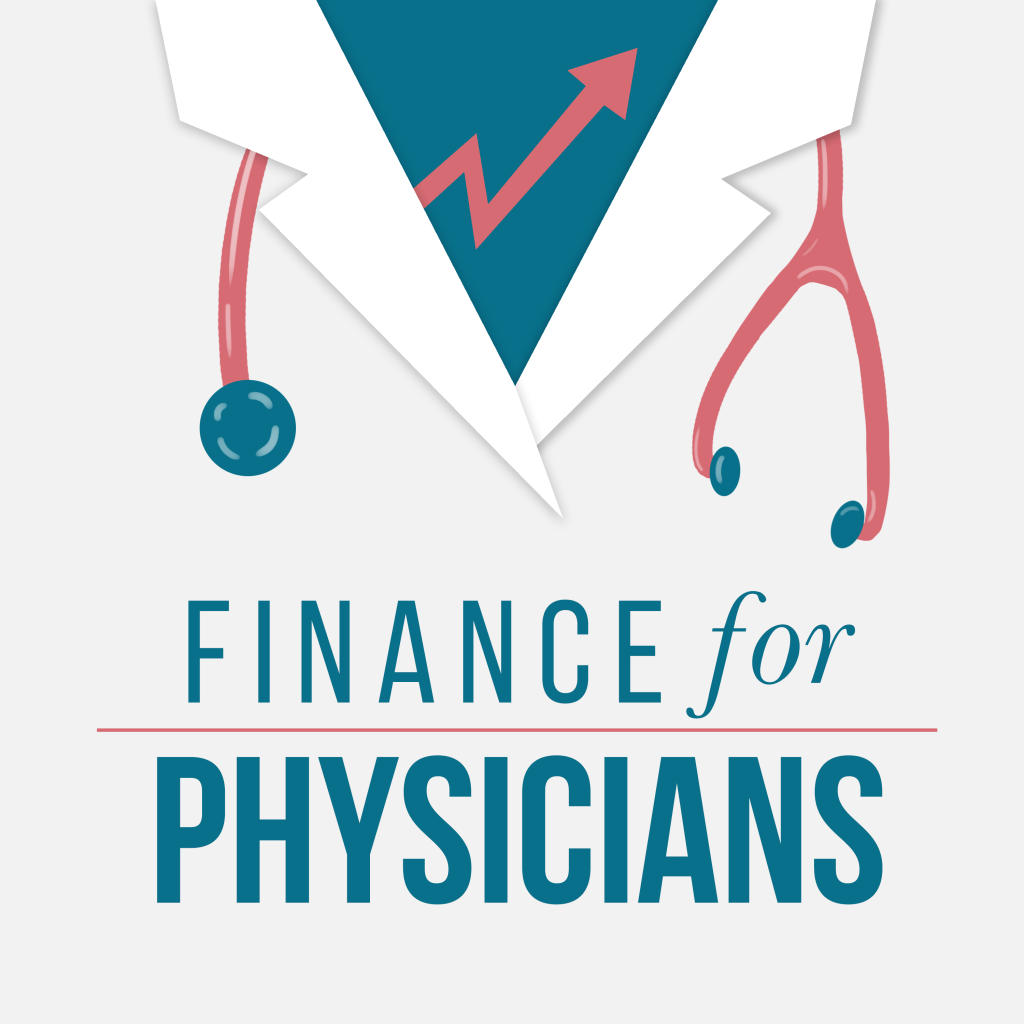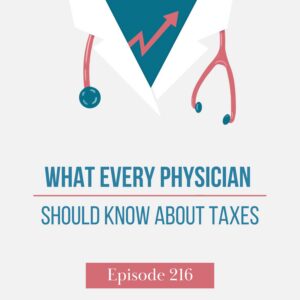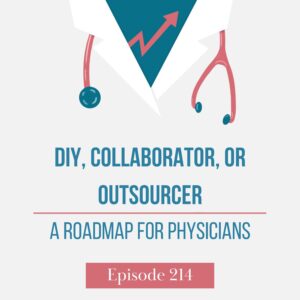- Connect with me on my LinkedIn
- Contact Finance for Physicians
- Finance for Physicians
- To schedule a call with one of our awesome planners, book HERE.
Full Episode Transcript:
Daniel Wrenne: A lot of times people are just like, “I need to stick it out,” and then—
Jennifer Quire: Work harder and get done with it fast.
Daniel Wrenne: And some people say work harder so that I can make more, so that I can save more, so that I can retire early, but that actually makes the negative issues worse. Because it requires, especially as a physician, most of the time, it requires more time…
Jennifer Quire: Or mental bandwidth.
Daniel Wrenne: Which typically amplifies all those negatives and then makes you want to retire even sooner.
Jennifer Quire: Or even harder to do it. So we have a never-ending cycle.
Welcome to Finance for Physicians, the show where we help physicians like you use money as a tool to live a great life. I’m your host, Daniel Wrenne, and I’ve spent the last decade advising physicians on their personal finances with the mission to help them understand that taking control of their finances now means creating a future where they can practice medicine where, when, and how long they want to.
Daniel Wrenne: Jen, what’s going on?
Jennifer Quire: Hello.
Daniel Wrenne: Thanks for joining me again. We’re on a roll. It’s been a while since we’ve done these. So I’m excited to start having some good conversations and putting it out on the podcast again. And I especially like—this is one of the, it’s a tricky topic we’re going to talk about today.
It’s a sneaky topic. It’s like, there’s this FIRE—I don’t know—FIRE movement. If y’all haven’t heard of what FIRE is, it stands for Financial Independence Retire Early. That’s what FIRE is. So we see this. Maybe people are not like saying the word FIRE, but we regularly see, and I’ve even felt this pressure myself.
This urge start to develop with people where they feel this pressure to work harder, to retire earlier. And it’s just kind of an interesting, and especially in the physician circles, it’s an interesting thing that I’ve noticed, for sure. Probably increasing the number of times people are bringing it up is like, “I need to find a way to retire earlier.”
In my experience, almost all families we work with the target that they want to be in a position to retire gets earlier as they get older. And that’s kind of another way of saying this, the same thing. And so we’re going to talk through like our experience of seeing that one, maybe why throw out some ideas of why that could be happening.
And I think it’ll be helpful for you guys listening to kind of see it from—maybe look at it from a different view. Because what we’ve experienced when we’ve worked through this with families is that once they peel back the layers on it, a lot of times they realize maybe that’s not the best path to get them where they want to go.
So, I think a good starting point for looking at this is getting into like what’s most important to you. Where do you want to go in your life? And so I think the straightforward answer would be like, “Retire early, duh,” that’s what we’re talking about.
So a lot of times it comes up in a goals conversation with, so we’re the financial planners. So we’re going to be the guy and gal that asks, “What are your goals?” And so a lot of times people will say, “Well, I know we talked about shooting for retirement age 65, but I really think we need to kind of move that number up.”
And so do we leave it at that? I mean, it’s okay. Here’s, say more.
Jennifer Quire: Tell me more about what’s causing you to want that to be earlier. And sometimes it’s, “I physically can’t do it.” Sometimes it’s, “I’m missing my kid’s soccer games on weekends.” Sometimes it’s, “I don’t get to hang out with my spouse anymore,” or, “I don’t have time to focus on myself at all. So I just need to be done with this sooner.”
Daniel Wrenne: Yeah. So all those reasons you just gave were kind of like negatives, right?
Jennifer Quire: Yeah.
Daniel Wrenne: Have you ever heard it come up when there’s like positive experiences with work?
Jennifer Quire: That’s a good point. Not really. It’s usually the avoidance of negative rather than “I’m working toward something positive at the end.”
It’s, “I gotta change something because of these bad things.”
Daniel Wrenne: Right. That’s been my experience as well, it with working with families. It’s also been my experience with work myself. Like, the job that I remember, I had a job in college that was like the worst job I ever had. It was painful, but it paid very, very well.
Which is part of the reason I kind of had to have it because it would pay for my school. But I literally work like a hundred-hour weeks and work every single day of the summer, like literally, like I get done with college and I work a hundred percent of all days, Monday through Sunday, a hundred-hour work weeks, get paid a bunch of money for those days, and then back to school.
So that was a problem in itself is just the number of work hours, but it was a manual laboring kind of job in the horse industry. And it was just a—first of all, I was like, I will go to great lengths to not have to do this.
Jennifer Quire: Ever again.
Daniel Wrenne: I’m like, retire early.
Like if that was my only option, I could see where that would be the obvious decision. But for me, I was like, new career basically. I was like, different career—not the career. Going a different direction. Yeah. But I can see how that feeling would come about. It’s like, I got to change something. And so a lot of times people are just like, I need to stick it out and then—
Jennifer Quire: Work harder and get done with it fast.
Daniel Wrenne: And some people say work harder so that I can make more, so that I can save more, so that I can retire early, but that actually makes the negative issues worse. Because it requires, especially as a physician, most of the time, it requires more time…
Jennifer Quire: Or mental bandwidth, like.
Daniel Wrenne: Which typically amplifies all those negatives and then makes you want to retire even sooner.
Jennifer Quire: Or even harder to do it. So we have a never ending cycle.
Daniel Wrenne: Yeah. So, say we have the conversation and we’re like, “Oh yeah, 55. Okay.” Well, you got to make a little more, you got to save a little more. And then it’s like, we talked to the same person, six months later and they’re like, “What about 50?”
Jennifer Quire: Yeah.
Daniel Wrenne: And then maybe they’re like, “And I’m having trouble in my marriage,” or something.
Jennifer Quire: “I’m never hom because I’m working so hard.”
Daniel Wrenne: Yeah, right. That’s completely—it’s almost predictable because if you push it—maybe you’re already pushing it. The more you push it, it’s just gonna cause bigger problem. So at the end of the day, with this underlying reasoning, we’re talking about everybody’s going to have slightly different variations, and maybe it’s not exactly the underlying cause for you to do that, but I would bet that a lot of people have felt that pressure when they dislike—have negative experiences with work.
Jennifer Quire: I would say one out of every three meetings is probably kind of focused around “Work is just too much. I got to change something. I don’t know what I have to change. I need a new job, or I need to scale back, or I need to work more.”
It’s very, very common that we’re having discussions around something has to change with work because it’s not sustainable in some capacity or another.
Daniel Wrenne: Right. That’s a good, yeah. Unsustainable is kind of the general theme of what I see with people is they’re like, “I can’t do this.”
And so what do we do about it? Like we’re talking about saving more to retire earlier, but like, and then we’re saying that doesn’t work. That actually makes it worse.
Jennifer Quire: Yeah. Some of my favorite conversations with people are—we were just talking before this—are when we try to get into the “why” and identify what are your reasons for being unhappy with your current situation.
Tell me more about why are we wanting to bring that number down? And like you said, again, it’s kind of those negatives. It’s all of these things that I’m not being able to do today. But the common way that people go about solving that is, “I’m going to work more now and then I’ll be done.”
One of the problems that I tend to run into with people is usually one of the top two reasons is, “I’m missing out on being with my kids or being with my spouse or being with my family. I can’t go to soccer games on the weekend, or I’m too tired.”
The problem with the solution being working harder now, is it doesn’t solve that problem today. And say we’re able to solve it in 10 years, do your kids even want to hang out with you at that point? Like, what if we explore changing something today?
What if we explore scaling back at work today, instead of working over time to try and be financially independent at 50, and the reason for that 50 is being that it’s unsustainable for you, what if we just work a little bit less and find a balance that makes it sustainable for you? That maybe drags that 50 out a little bit but allows you to enjoy time with your kids with their young, allows you to fix issues that you’re having at home.
I think we almost look at that backwards. Sometimes we look at the end result and shoot for the end result rather than trying to fix the problem today.
Daniel Wrenne: Yeah. Working less, typically it’s tied into time. And that was my experience when I was talking about most of my issue was when I had that job that I hated, it was ’cause I was partially ’cause I was working so many hours.
And everybody will blow out burnout when you’re working 80 hours weeks like guarantee. So like working less. But what if I feel like I have to earn the money?
Jennifer Quire: Sure, I think that’s why it’s important to have both spouses involved in this process, because I think it seems that most people are on the same page when you get down to the family values side of things, and if we decide that time is the number one thing, then we’re probably going to be on the same page about how we go about finding a solution to that, whether it’s changing our house scenario, whether it’s changing how we’re spending, whether it’s just kind of doing a values regroup on if this is the number one issue and we want to focus on more time, we can find a way to do that.
We’re probably just going to have to change some behaviors or some circumstances.
Daniel Wrenne: Yeah. I think it would be an interesting thought exercise to be like, okay, well, let’s say the—you gave the example, like I don’t get to go to my kids games or whatever. That’s a common one. And so you could say, well, what if you work less and freed up time and was able to do that now? How would that change your life?
Would it be an improvement and what would be the value of that as opposed to like retiring early? It doesn’t solve that underlying problem.
Working less is the obvious one to free up the time. You work less, you free up the time, you can go to the game. That’s obvious. But I think what usually there’s this pressure, you feel like you can’t work less, and so then your mind goes to like, okay. I get what you’re saying, but like, either I can’t afford, or like my patients, I’ve heard people—physicians, a lot of times, feel guilty with the patients.
They’re like, I can’t let people down and all that. But like let’s stick with the can’t afford thing. Like I can’t afford to do that. And so, well then the question is, what are you spending the money on? Or like maybe they’re saving already to retire early. And so like what are you going to do with your time then?
Like you’re basically buying future time and telling me that you need time now. That doesn’t make sense.
Jennifer Quire: Two of the questions that I always like to ask when we’re going through goals exercises with people is, one, if you are financially independent today, what would you do differently?
Because I think that’s telling of what are your real priorities? How do you feel about the job? If people say, “You know what, actually it’s great. I wouldn’t change anything.” Great. But a lot of people would say I would scale back immediately. I would still work in some capacity or I’d go crazy, but I’d like to be able to be home longer.
And then you say, okay, well, apply that to your financial independence years. If you’re financially independent at 50, most people that we work with are very driven, very goal-oriented, very, I need to be doing something with my time. It’s very rarely that someone is actually financially independent at age 50 and quits working and never does anything ever.
Daniel Wrenne: What would you do?
Jennifer Quire: What would you do? And then when you’re 50, depending on how old your kids are, they’re in high school, college, they’re married, they’re gone. They have their own lives. You missed out on, on the young part, trying to stay for now. So if we can find a way to flip-flop that and like you said—
Daniel Wrenne: Also, identity too, like when you spend the 80 hours a week or dedicate so much to something, it wraps up, it becomes your identity and you’re not going to want to hang up the towel, throw in the towel, and something when you’re still healthy and 50 and to do what?
Jennifer Quire: Yeah.
Daniel Wrenne: I don’t know what I would do if I was retired. I’d be bored out of my mind. You got to retire to something.
Jennifer Quire: Yes. Yeah. We need a plan for that age. What does it look like after?
Daniel Wrenne: Yeah. Yeah. I mean, at the end of the day, it’s all about balancing and priorities, and it’s easy to get out of whack. And we were talking earlier about spending and balance and that sort of thing, and I think one of the hardest situations is when you have committed to such a high lifestyle and you feel the pressure.
Like a lot of hospitals will offer younger physicians—I can’t stand it when I see this happen—they offer younger physicians like it’s guaranteed salaries for like two years, and then it’s got like a RVU transition after two years. And so they kind of lock you in for whatever, you’re making $200,000 a year. And then after two years, you switch to RVU-based production.
And so you get the house and all the stuff and whatever. And then you switch into trend or you transition to RVUs. And they’re like, you have the conversation with the manager or whatever. Administrator doesn’t really care about your patients. And they’re like, “Oh yeah, here’s our view numbers.”
You actually need to bump them up by 40%, 20%, whatever, in order to maintain this guaranteed salary that happens very regularly. And so then they basically squeeze you even more. You’re already probably working 50-hour weeks or something. I don’t know, maybe more. And then they’re like, “Oh, by the way, we need you to do more.”
And on top of this, so basically you’re getting squeezed even more and you’ve already kind of committed to the lifestyle at the level that they promised you.
Jennifer Quire: So you have to do it.
Daniel Wrenne: Which is just wrong. I think.
Jennifer Quire: Which I think also ties back to the house thing and the goals exercise and things like houses are very limiting factors for how much flexibility you have to do things like this in the future.
So I think that’s even more important when you’re going through those things early on to just say, we buy at the top of what we might be able to sustain. There’s just going to be limited flexibility for you to scale back a little bit or not take those extra shifts or pressure to work more.
Daniel Wrenne: Yeah. You want to be able to be in a financial position to where you’re able to say no, like.
Jennifer Quire: Yes.
Daniel Wrenne: When your job starts trying to take advantage of you, you want to be in a financial position to where you can be like, “No, I’m not doing that.” And to where you’re not freaked out that you’re going to have trouble making your bills the next month.
And that’s ideally, the sooner you can get there, the better. And part of that is on the front end, like building in a balance and managing lifestyle so that you’re not slave to your work at the end of the day. That’s a lot of times the underlying problem. It’s like, if you’re a slave to your job, like you’ve sold out kind of like all this lifestyle is kind of fueling your feeling of having to go to work, you feel like there’s no options.
If you’re in that situation, you have to focus more on the lifestyle. You gotta be like, “I gotta unwind the lifestyle.”
Jennifer Quire: Which is tough.
Daniel Wrenne: Which is tough, but not impossible. It’s just, you did it when you were a resident. So ideally you just live like a resident transition. And that’s what white coat ambassador Jim had always gives people the advice to live like a resident, which is generally good advice because if you continue living like a resident, you have a ton of margin built in.
Jennifer Quire: Balance to everything,
Daniel Wrenne: Which, you’re never going to get perfect balance, but ideally we can kind of move that direction. So anyway, what’s interesting too. So as we kind of wrap up, I think it would also be good to kind of share our experiences. So I’ve worked, I’m sure Jen has had similar experiences, like when I’ve worked through this, maybe we can kind of share like what it’s looked like on the back end, like after helping people to kind of reframe it.
And so what I’ve seen is people are like, if they can kind of scale back, usually on their time they’re spending in their job and kind of refocus it towards the things that are problem points. They tend to be like their retirement age goes later.
Jennifer Quire: Well, cause you think about the reasoning behind something like a retirement age, and it’s usually like, I just don’t want to be in the position that I have to work anymore.
Or I don’t think I could work longer than that because my body will give out, or it’s much less based on, like, the qualitative parts of things. And if we can shift that mindset from, I want to get here down the road. It’s I want to get here today and making those changes will impact things down the road like this.
But they won’t feel as bad because—back to that word—it’s more sustainable. If we’re not killing ourselves, you can work longer and it doesn’t feel as daunting for that number to start with a sixth and a five because and the trade-offs, at least in our experience, seem very worth it for people.
Daniel Wrenne: Yeah.
And I think, work is not always going to be perfect. And some people are like, you don’t give up until you find the job you love. Cause then it won’t feel like work. And I mean that maybe that’s not possible for everybody, but I think it’s something at least to shoot for, like you can, and balance is a start to that.
But then you can also kind of think about like the other benefit when you have good balance and good. You’re good with your finances is you have the courage. Like I was saying a minute ago to say no, which allows you to move more towards environments that are better fit for what you’re trying to work in.
And so that’s the ultimate is if you have good balance and you’re doing the things that are important and you’re working in a job where in the culture and the profession that you enjoy most of the time, and so it doesn’t really feel like super stressful. Maybe it feels like hard work some, but at the end of the day, it’s something like I could do this forever.
I think that’s the ultimate spot.
Jennifer Quire: I’ve seen a pretty significant kind of shift in my own thinking too, when I was earlier on, I was like, I’m going to just save every single penny. I’m going to be done when I’m 50. And then I’m just going to go travel the world. And then COVID happened. And we got a lot of unfortunate and sad perspective through COVID that 50 is not guaranteed.
45 is not even guaranteed, none of it’s guaranteed. So we have to find a way to enjoy today and build in balance today and maybe that’s saving a little bit less so there’s more in the wiggle room so you don’t have to work as much so you can go see your kids or so you can take that vacation. It’s all about finding that balance, and I think there’s this Idea that because we’re financial advisors, I’m going to tell you to save every single penny.
No, I want your money to help you live the life that you want to live. And that doesn’t mean saving every single penny. It means finding a balance between doing today what you want to do and making sure that we’re also planning for the future. But I don’t think we’re the kind of place that’s going to be like, you have to save every single dollar and that means no travel or spending time with your kids.
You’ve got to work as hard as you possibly can until you can retire, and then you can enjoy life. Like, we’ve got to enjoy life.
Daniel Wrenne: If anything, I’m like reverse FIRE or whatever that is. Work. So, FIRE is Financial Independence, Retire Early. So, I’m more like let’s see if we can set it up to where you can work forever.
But maybe have the options. You want options too, but build in flexibility and work part-time when you’re older, not the worst, especially if you enjoy your job that you’re in.
Jennifer Quire: Or even some other job, even if it’s not, you’re a doctor forever, but maybe you do something else or it’s very rare that we see people go from a hundred to zero, like it just, but we plan that way, so.
Daniel Wrenne: Yup. Awesome. Well, any parting thoughts?
Jennifer Quire: Hang out with your kids. Take the trip. We’ll find a way to work.
Daniel Wrenne: Yeah. Yeah. Try to think about it. The other part. The last thing I would say is the other part about when you’re in the grind, like when you get in the grind. Hopefully you’re listening to this.
That’d be great. Because some people are so in the grind that it’s like, they don’t even have any spare time to do anything. So that’s the challenge is like the more you get in the grind, the harder it is to think about anything outside the grind. And so we’re advocating just to kind of open up a little space and then think about it and hopefully start to move the other direction away from the grind.
Jennifer Quire: Yeah.
Daniel Wrenne: Right. Cause grind the grinds a killer. That’s for sure, so.
Jennifer Quire: Not sustainable.
Daniel Wrenne: Not sustainable.
Jennifer Quire: Not sustainable.
Daniel Wrenne: Without a doubt. All right, Jen, good catching up as always. And look forward to doing this again soon.
Jennifer Quire: Yeah, let’s do it.








